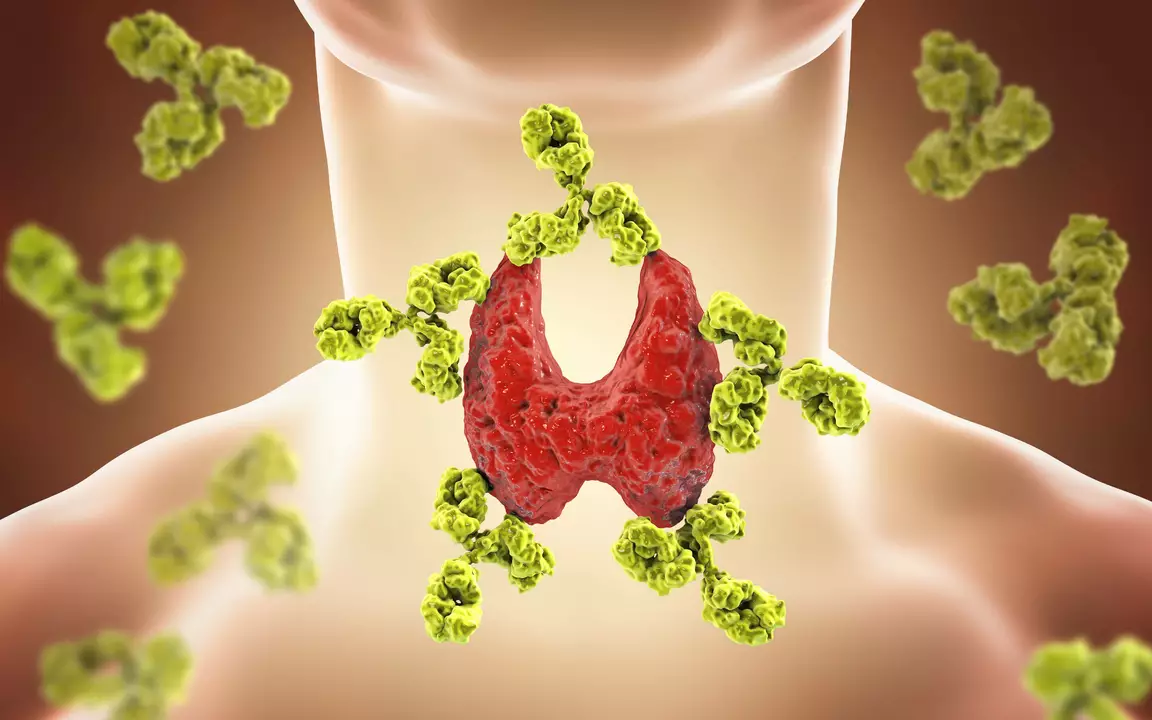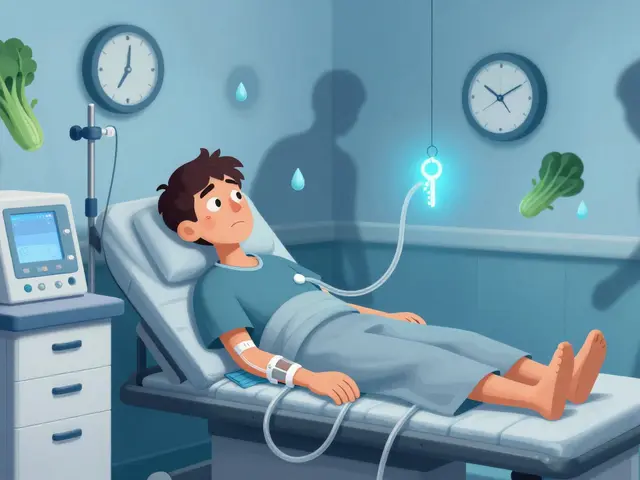 13
May,2023
13
May,2023
Understanding Hashimoto's Disease and Thyroid Cancer
As a blogger who has been researching and writing about various health topics, I've come across a connection that has intrigued me and might interest you as well. I'm talking about the connection between Hashimoto's disease and thyroid cancer. In this article, we will explore the relationship between these two conditions and delve into the possible implications of their connection. So, let's begin by understanding the basics of Hashimoto's disease and thyroid cancer.
What is Hashimoto's Disease?
Hashimoto's disease, also known as Hashimoto's thyroiditis, is an autoimmune disorder in which the immune system mistakenly attacks the thyroid gland. This attack leads to inflammation and damage to the thyroid, which can cause it to produce fewer hormones than needed by the body. These hormones, known as thyroid hormones, play a crucial role in regulating various bodily functions, including metabolism, energy production, and temperature regulation. When the thyroid gland is unable to produce sufficient hormones, it can lead to a condition called hypothyroidism, which is characterized by fatigue, weight gain, depression, and other symptoms.
What is Thyroid Cancer?
Thyroid cancer is a type of cancer that begins in the thyroid gland. There are various types of thyroid cancer, including papillary, follicular, medullary, and anaplastic thyroid cancer. Each type has its own characteristics and treatment options, but generally, thyroid cancer is considered a treatable and often curable form of cancer, especially if detected early. Some common symptoms of thyroid cancer include a lump in the neck, difficulty swallowing, changes in the voice, and swollen lymph nodes. However, these symptoms can also be indicative of other, non-cancerous thyroid conditions, so it's essential to consult your healthcare provider for an accurate diagnosis.
Exploring the Link Between Hashimoto's Disease and Thyroid Cancer
Given that both Hashimoto's disease and thyroid cancer affect the same gland, it's not surprising that researchers have been exploring the possible link between the two conditions. While the exact relationship remains unclear, studies have suggested that people with Hashimoto's disease may be at a higher risk of developing thyroid cancer. This increased risk may be due to the chronic inflammation caused by the autoimmune attack on the thyroid gland, which can lead to cellular changes and eventually the development of cancerous cells.
Diagnosing and Monitoring Thyroid Conditions
Understanding the connection between Hashimoto's disease and thyroid cancer highlights the importance of regular monitoring and early detection for people with thyroid conditions. If you have Hashimoto's disease or another thyroid condition, it's essential to work closely with your healthcare provider to monitor your thyroid function and check for any signs of cancer. This may include regular blood tests to check your thyroid hormone levels, as well as imaging studies like ultrasounds or biopsies if a nodule or lump is detected.
Managing Risk and Optimizing Thyroid Health
While the connection between Hashimoto's disease and thyroid cancer may be concerning, it's important to remember that living with a thyroid condition doesn't necessarily mean you'll develop cancer. There are many steps you can take to manage your risk and optimize your thyroid health. This includes following your healthcare provider's recommendations for medication and treatment, maintaining a healthy lifestyle with a balanced diet and regular exercise, and monitoring your thyroid function and overall health.
In conclusion, the connection between Hashimoto's disease and thyroid cancer is both fascinating and important to understand. While more research is needed to fully comprehend this relationship, it's clear that early detection and proper management of thyroid conditions are crucial for preventing complications and maintaining overall health. If you or a loved one has a thyroid condition, stay vigilant with regular check-ups and follow your healthcare provider's advice to optimize your thyroid health and minimize your risk of developing thyroid cancer.





Oh great, another thrilling link between an autoimmune disease and cancer, just what we needed.
Wow!!! This info is super helpful!!! I'm gonna share it with all my friends!! Let’s stay on top of our health!! It’s like a health‑hack party!!! Definitely keep an eye on those thyroid levels, ok??
While the lay‑press often simplifies the nexus between Hashimoto's thyroiditis and thyroid neoplasia, a rigorous examination of the literature reveals a nuanced interplay of immunological and oncogenic pathways. The chronic lymphocytic infiltration characteristic of Hashimoto's creates a micro‑environment conducive to DNA damage via oxidative stress. Moreover, cytokine profiles such as elevated interleukin‑6 and tumor necrosis factor‑α have been implicated in proliferative signaling within thyrocytes. Epidemiological surveys, notably those emanating from Scandinavia, indicate a modest yet statistically significant increase in papillary carcinoma incidence among Hashimoto patients. Nevertheless, confounding variables-particularly diagnostic surveillance bias-must be meticulously accounted for to avoid over‑interpretation of associative data. Molecular investigations have identified RET/PTC rearrangements and BRAF V600E mutations within nodules arising in a background of autoimmune thyroiditis, suggesting a convergent oncogenic cascade. From a pathophysiological standpoint, the perpetual regenerative pressure imposed by hypothyroidism may predispose thyrocytes to neoplastic transformation. It is also worth noting that thyroid autoantibodies, while primarily markers, may exert direct effects on cellular adhesion and apoptosis. Consequently, clinicians should adopt a balanced approach: vigilant monitoring without succumbing to undue alarm. Ultrasound surveillance, complemented by fine‑needle aspiration of suspicious nodules, remains the cornerstone of early detection. Patient education about symptomatology, such as new‑onset dysphagia or voice changes, is equally paramount. In sum, the evidence supports a correlation, albeit modest, and underscores the importance of individualized risk assessment. 😊
I totally agree with the need for regular check‑ups-especially because early detection can make such a huge difference. Thanks for breaking it down in a friendly way!
From a broader perspective, the interplay between autoimmune mechanisms and oncogenesis invites us to contemplate the delicate balance of self‑tolerance. It reminds us that the body’s protective systems can, under chronic stress, inadvertently foster pathology. Embracing holistic health practices, such as stress reduction and nutrient‑rich diets, may support both immune regulation and cellular integrity.
Just a quick note: make sure you double‑check your thyroid hormone levels any time you notice new symptoms. It’s a simple step that can prevent bigger issues later.
Interesting point but I think the focus on hormones overshadows the genetic factors that are equally important
Look, the American healthcare system has been downplaying the risks for far too long. We need to demand more aggressive screening protocols and stop letting bureaucrats decide what’s best for our thyroids. This isn’t just a personal health issue; it’s a matter of national health security. If we don’t act now, we’ll see a surge in preventable cancers that could have been caught early. The data is crystal clear, and yet policymakers drag their feet. We must hold them accountable and push for mandatory annual ultrasounds for anyone diagnosed with Hashimoto’s. It’s time to put America’s health first, and that starts with taking the thyroid seriously.
Totally feel you! 🌟 Early screening saved my aunt’s life – she’s doing great now. Let’s keep the convo going and spread the word! 👍
Regular monitoring is essential; it aligns with global best practices for endocrine health.
Everyone’s talking about "screening" like it’s a harmless routine, but have you ever wondered who profits from the endless wave of unnecessary tests? The pharma and imaging industries push us to get scanned every few months, all while claiming it’s for our own good. I’m not saying we should ignore genuine concerns, but the constant medical surveillance feels more like a control tactic than a care tactic. Stay vigilant, friends.
This whole link between Hashimoto’s and cancer is way overhyped – most ppl never get cancer, so stop freaking out.
Wow!! You sound so confident!! But maybe a little more nuance would help!!
meh, same old stuff.
It’s fascinating how the immune system walks the line between protection and pathology, reminding us that health is a dynamic equilibrium.
Yeah but stats are just numbers, not truth 😂
Let’s all stay motivated and keep those check‑ups on schedule – it’s worth it!!
Excellent reminder! Regular monitoring can catch issues early, and a proactive approach is always beneficial.
Only true patriots understand the importance of safeguarding our health against hidden threats – stay alert! :)